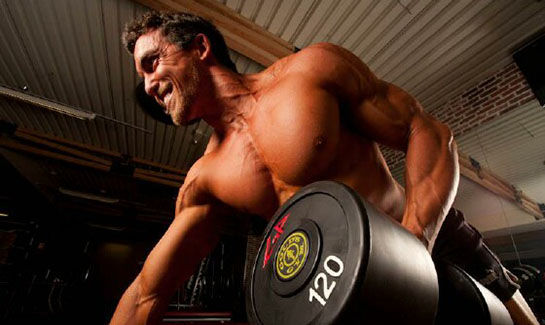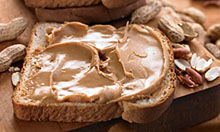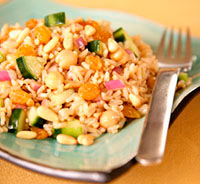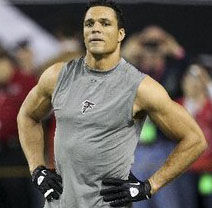
By Jim Gerard
Baseball’s Prince Fielder is a vegan. So is NFL star Arian Foster (most of the time), mixed martial arts pro Mac Danzig, ultra-marathon runner Scott Jurek, the Toronto Maple Leafs’ Mike Zigomanis and bodybuilder Derek Tresize.
Yet, while the vegan diet, which is totally plant-based (no meat, fish or dairy), nudges its way into the mainstream of society, questions about its benefits proliferate—especially when competitive athletes adopt it. In the minds of many people, including some nutrition experts, athletes must consume meat and dairy products to build muscle and get into optimal condition.
This belief isn’t grounded in scientific evidence—because none exists.
Nancy Clark, R.D., a sports nutritionist in the Boston area and author of Nancy Clark’s Sports Nutrition Guidebook, told The New York Times in 2012 that “a presentation about vegetarian athletes at the American College of Sports Medicine Annual meeting concluded that there’s not enough research to know how vegetarian—let alone vegan—diets affect athletes.”
Julieanna Hever, M.S., R.D., author of The Complete Idiot’s Guide to Plant-Based Nutrition and a vegan for six years, is convinced that athletes can thrive on a vegan diet. However, she admits: “Nobody has researched the health benefits of the vegan diet for competitive athletes.”
Haver grounds her belief in experience. She maintains that, based on feedback from her clients and people she has interviewed, “Athletes perform better on a plant-based diet, and, since vigorous exercise exposes you to higher levels of free radicals, they’ll also recover faster with a plant-based diet full of antioxidants [which squelch the radicals].”
So while the issue is a “he said, she said” dispute based on subjective, anecdotal evidence, a growing number of “on the ground” experts—nutritionists, athletes or some combination thereof—are giving vegan competitors the green light.
Natural bodybuilder Derek Tresize is one example of a flourishing vegan athlete. Tresize, owner of Root Force Personal Training in Richmond, Va., became a natural bodybuilding competitor two years after becoming a vegan. Tresize has entered four contests and won one, and he says he is “always the only vegan out of 60 to 80 competitors.”
Three Questions to Ask When Considering a Vegan Diet
Jennifer McDaniel, R.D., a spokesperson for the Academy of Nutrition and Dietetics, says that athletes have three major questions when considering a vegan diet:
- Will the diet give me what I need for optimal performance?
- Will I get enough nutrients to maximize energy?
- Is a vegan diet deficient in certain nutrients? (If so, will supplements replace those nutrients, and which ones should I take?)

Useful Advice for Vegan Athletes (and the People Who Train Them)
- Educate yourself, whether for your own sake or your clients’. “A lot of vegans don’t understand how little protein there is in their diet,” Clark says. “They have a couple of chickpeas on their salad and think they’re set. Plant foods aren’t very concentrated sources of protein. You have to eat a lot of peanut butter and hummus.”
- Be careful not to be overly restrictive. Eat a variety of foods to avoid nutrient—and energy—deficiency.
- If a client approaches you with questions about converting to a vegan diet, refer him or her to a registered dietitian, especially one well-versed in the vegan diet. If you’re a vegan, don’t try to convert your clients and by all means avoid the argument that eating meat is unethical.
The answer to the first question is “Yes,” if you’re doing it right. Felicia Stoler, a nutritionist in Holmdel, N.J., says, “It’s difficult to be a competitive athlete as a vegan, because all athletes have higher-than-normal protein and calorie needs. And animal sources of protein are complete and bio-available, [meaning the body can use of them more readily], compared to protein from plant foods.” That said, by carefully choosing complementary protein sources and monitoring overall intake, vegan athletes can consume adequate amounts of protein to fuel their performance.
Debate also continues about whether the benefits of a vegan diet vary depending on the athlete’s sport and type of training—for example, going vegan may make it more difficult to build the muscle mass necessary to compete in power sports, but may not be as much of an issue for endurance athletes like marathoners or cyclists.
“It might be harder to bulk up, but easier to lean out,” says Haver. “Two solutions for vegan athletes would be to move to a lower weight class in competition or increase their overall caloric intake.”
Dr. David Nieman, director of the human performance lab at the North Carolina Research Campus of Appalachian State University, feels that a vegan diet would better help the endurance athlete. “The vegan diet is high in carbohydrates and low in fats, so it will naturally support endurance performance. People feel that the plant-based nature of the diet will magically support performance, but it’s the carbs that do it.”
Dr. D. Enette Larson-Meyer, associate professor at the University of Wyoming and author of the book Vegetarian Sports Nutrition, concurs: “Distance athletes need [protein] for muscle repair, whereas strength athletes require it for muscle mass. You can complete an intense weightlifting session without expending as much energy as you would during a long run. Endurance athletes burn more calories, so it’s harder to meet their nutrient needs.1”
1 It’s estimated that 12 percent of a vegan diet is protein. If a power athlete burns 1,500 calories in a workout, it’s easier for him to replace the necessary protein than an endurance athlete who may burn 2,500 calories.
Specific Vegan Challenges
Athletes such as Tresize and Arian Foster have proven that it’s possible to be an elite vegan power athlete. Regardless, competing as a vegan in any sport presents challenges that carnivores don’t face (see sidebar on NFL tight end Tony Gonzalez’ experience with going vegan).
The vegan athlete’s foremost concern is getting sufficient calories—ensuring that his or her energy consumption matches energy expenditure. Plant foods pack a lesser punch per volume—not just in protein, but overall calories—so vegan athletes may have to jack up their caloric consumption. Tresize recognized this early on. “Plant products are not only less calorically dense, but less anabolic, which decreased my retention of fat as well as muscle. So I had to increase my caloric intake by 10 to 20 percent.”2 (For maintenance, he takes in 4,000 to 4,500 calories, and 3,000 pre-contest, per day.)

Why Do People Become Vegans?
1. According to the Vegan Society, a vegan diet “meets many current healthy eating recommendations such as eating more fruit, vegetables and whole grains and consuming less cholesterol and saturated fat.” Vegans believe that a plant-based diet provides more than enough vitamins, antioxidants and fiber and can decrease the risks of diabetes, heart disease, stroke and some cancers. “I’d always felt red meat was necessary for bodybuilding,” says Derek Tresize. “Then I met my wife, who explained to me the health reasons for being a vegan.”
2. Many vegans argue that eating animal flesh is unethical, and they object to the conditions animals are subjected to in the industrial food system.
3. Vegans claim that plant-based diets enhance the environment, that they produce fewer greenhouse gas emissions and require only one-third of the land and water needed to produce a typical Western diet.
Of equal concern is how to ingest an adequate amount of protein—especially if you play a power sport. “If you’re a vegan in a rigorous resistance-training program,” says, Nieman, “you need 30 to 50 grams of protein more a day than meat eaters.” However, he adds, “the quality of plant-based protein is just as effective as non-vegan, as long as you’re eating an assortment of sources, such as soy, nuts and seeds. It’s just that the concentration of protein in meat products is greater.”
Haver says that vegans can get all the protein they need from soy products, legumes, beans, lentils, leafy green vegetables (up to 43 percent of their calories are protein), nuts, seeds, whole grains (such as quinoa, which is the only plant complete protein), wild rice (which has 7 grams of protein per cup) and sprouted grain breads (8 grams per slice).
Another important concern for vegan athletes is obtaining enough vitamin B-12, which is vital for red blood cell production. “Athletes who don’t consume any animal products—which supply plenty of B-12—must take a supplement,” explains Larson-Meyer. “The supplemental dosage amount can be as low as 2.4 to 2.6 micrograms if you’re eating lots of plant foods that come fortified with it, such as soymilk, cereals and nutritional yeast.”
The best source of omega-3 essential fats, which are important for controlling inflammation, is fish. So the vegan athlete must dig for them in walnuts, flaxseed, chia seed and plant-based micro-algae supplements. (Substitute plant-based DHA capsules for fish oil pills.)
Depending on their food selection, some vegan athletes may not get enough calcium.3 “You can meet your calcium needs without meat or dairy,” argues Larson-Meyer, “but its plant-based sources are foods that are less familiar to most Americans, such as kale, which even if you like it you probably won’t eat nearly as often as milk or yogurt.”
Iron is another nutrient potentially elusive to vegans. The good news is that you can get it readily from many plant-based foods, as long as you don’t consume it with foods that inhibit its absorption, such as tea and coffee, or—and here’s the tricky part—consume high amounts of calcium.
Zinc is another important nutrient more commonly found in—and better absorbed from—animal products. The best plant-based sources are legumes, nuts, seeds and whole grains. “We don’t know very much about zinc absorption, so I wouldn’t recommend taking supplements,” Larson-Meyer says.
Would you believe that there’s a worldwide deficiency of vitamin D (a performance-enhancing nutrient linked to immune health, inflammatory mediation and muscle function)? It’s true, perhaps caused by our office-based work lives and, ironically, excessive use of sunscreen. It’s most accessible in dairy products, so vegans must turn to cereals, soy products and orange juice fortified with it—or spend 10 to 15 minutes a day in good, old-fashioned sunlight.
2 Nieman says the volume of plant foods is higher than meat products—because they contain more fiber, which goes undigested—but not the number of calories.
3 A study from Oxford University found that vegans have a 30 percent higher risk of bone fracture, possibly as a result of lower calcium levels in their diet.
To return to the question of optimal performance, the consensus is that vegan athletes can train exactly the same way as non-vegans. It’s all about the diet.
Haver says that, in general, the worse your diet was to begin with, the greater the chance you will feel some initial gastrointestinal discomfort due to increased fiber consumption. But these “detox symptoms,” as she puts it, only last a few days.
Another trial for vegans is that finding acceptable foods is not always convenient in our fast-food nation. “It’s easier than ever to be a vegan, as more restaurants have added vegan-approved entrees to their menus, but it’s still a challenge,” says Nieman. “It will require more planning. [Vegan athletes] may have to carry a special lunchbox packed with fruit, nuts and vegan-acceptable energy bars.”
Contrary to what many believe, going vegan won’t break your wallet. Many whole foods—produce, legumes, whole grains—are inexpensive, especially if you buy them in bulk. Plus, preparing vegan foods is one of the easiest ways to cook, says Haver. “All you need is an electric steamer to make dozens of dishes.”
The highest hurdle a vegan athlete may have to surmount is peer pressure to consume a meat-based diet. “If you don’t have a lot of self-confidence,” says Clark, “becoming a vegan might be hard to maintain. It’s nice when everybody eats from the same pot.” Tresize says his gym-mates teased him mercilessly, but “once they saw my gains, they quieted down.”
Tony Gonzalez: Performance or Health?

All-Pro tight end Tony Gonzalez, most recently with the NFL’s Atlanta Falcons, put his career on the line when, several years ago, he sidestepped the meat-laden locker room smorgasbord in favor of a vegan buffet table. His conversion moment was a chance encounter with a fellow airline passenger, who introduced him to The China Study, a 2006 book (and Bible to many vegans) by Cornell professor and nutrition researcher Dr. T. Colin Campbell. The China Study claims that people who eat mostly plants have fewer deadly diseases than those who eat mostly animal flesh. Campbell’s evidence was diet surveys and blood samples of thousands of Chinese.
Even as Gonzalez became convinced that a carnivorous diet could shorten his life, he feared that a vegan diet could also jeopardize his career—and his chance to break the all-time record for receptions by a tight end. In training camp (with the Kansas City Chiefs), he lost strength, then weight.
In desperation, he called Mr. Campbell, who suggested adding more plant protein to his diet, but it wasn’t enough. Then the Chiefs’ nutritionist, Mitzi Dulan (a former vegan athlete), convinced him to “cheat” and add a few servings of fish and chicken per week. Gonzalez regained his strength and confidence, and in that season’s final game, broke the reception record.
Perhaps Gonzalez’s story inspired Houston Texans’ running back Arian Foster, who adopted a (mostly) vegan diet during the 2012 off-season and led the league in touchdowns.
________________________________________________________________________________________

Jim Gerard is an author, journalist, playwright and stand-up comic. He has written for the New Republic, Travel & Leisure, Maxim, Cosmopolitan, Washington Post, Salon, Details, New York Observer, and many other magazines. For more information, visit his site at www.gangof60.com.